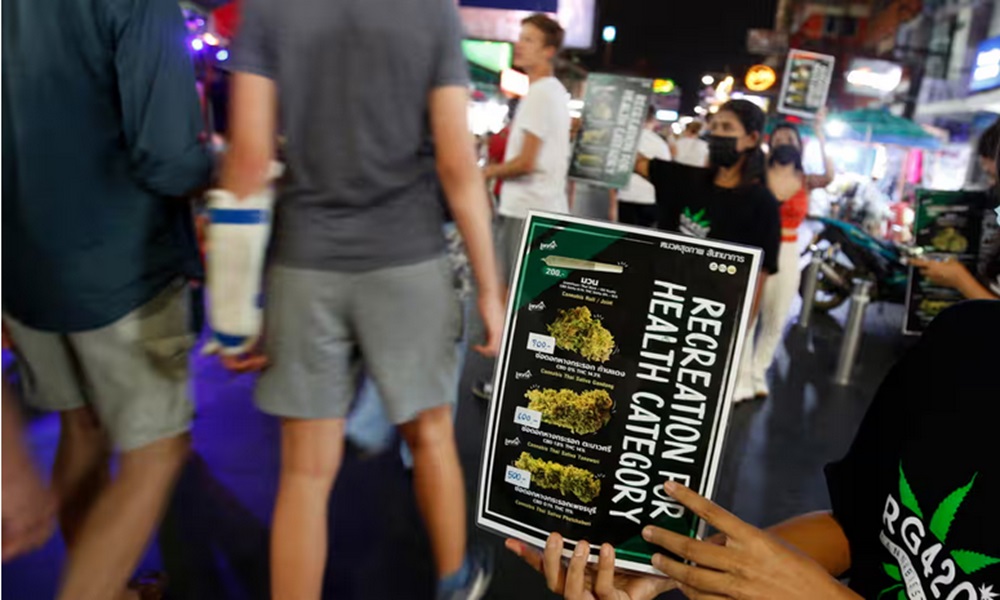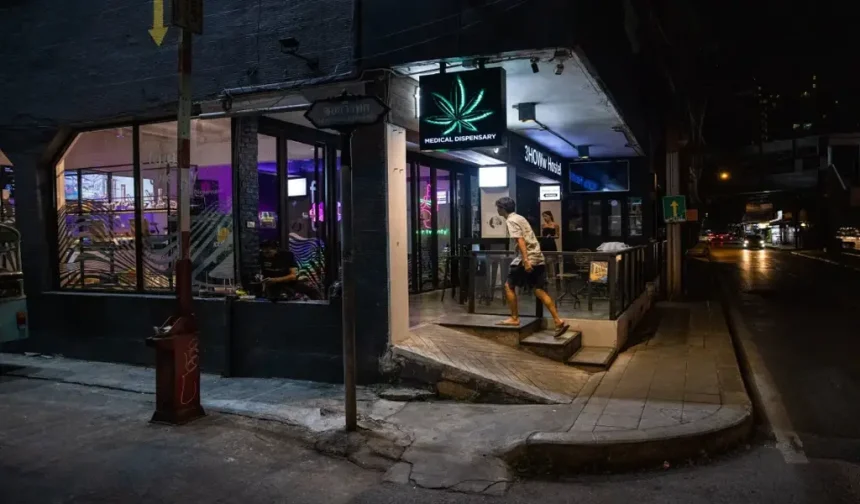(CTN News) – The ongoing debate in Thailand’s Parliament suggests that cannabis will not be recriminalized or strictly regulated in the near future.
On July 23, Prime Minister Srettha Thavisin softened his stern stance on relisting ganja as a narcotic after Bhumjaithai, a crucial coalition partner in his government, strongly opposed the move.
Bhumjaithai leader Anutin Charnvirakul, who also serves as deputy prime minister and interior minister, has warned of economic ramifications if the government changes its marijuana policy.
“Who would want to invest in Thailand?” the man questioned.
Numerous investors, both domestic and foreign, have established marijuana and related businesses in Thailand since Bhumjaithai successfully lobbied for cannabis legalisation.
Thailand’s rapidly growing cannabis and hemp business is currently worth 36.52 billion baht, up from 31.75 billion baht last year, according to the Thai Chamber of Commerce’s Centre for Economic and Business Forecasting.
Last weekend, Anutin played golf with Thaksin Shinawatra, the patriarch of the coalition-leading Pheu Thai Party, who is thought to wield significant power over Srettha.
The prime minister has now opted to address the rise in recreational marijuana use through law rather than ban.
Public Health Minister Somsak Thepsuthin stated that four independent marijuana laws are now being studied, but the legislative process is moving slowly. As a result, Thailand should first reinstate marijuana on the narcotics list, he added.

“However, I must follow the National Narcotics Control Board’s decision. “We’ll see what the board decides,” he remarked.
On July 5, the National Narcotics Committee voted a resolution to relist marijuana as a narcotic; however, the decision will only take effect if it is approved by the board.
Medics have expressed dissatisfaction with the delay in limiting cannabis use.
Dr. Smith Srisont, a member of the Medical Council and head of the Forensic Physician Association of Thailand, stated that recent developments demonstrated that politics was impeding the route to adequate regulation.
“Going back and forth or emphasising that cannabis control should be done via the marijuana law means the legal vacuum will continue,” he said. “And the public will continue to bear the brunt.”
Anutin, despite his assertions, had never truly listened to what others had to say regarding marijuana’s negative health effects, Smith grieved.
“Research in both Thailand and other countries shows marijuana consumption causes many negative effects, but he [Anutin] keeps saying there is no solid evidence for this,” he told me.
Prof Dr Sawitri Assanangkornchai, a professor at Prince of Songkla University’s Faculty of Medicine, recently released the findings of a study she led on Thailand’s marijuana legislation during a seminar. She stated that the findings showed that one in every five Thais had used marijuana, usually for recreational purposes.
“Youths start using marijuana out of curiosity,” she added, noting that the drug is now widely available, with nearly every Thai having a marijuana shop within 400 yards of their home. Cannabis is also sold online through popular platforms such as Twitter, Facebook, and Line.
Meanwhile, a study conducted by Chulalongkorn University’s Centre for Addiction Studies anticipates that the number of marijuana users in Thailand will increase to 11 million in 2023, up from 1.8 million in 2021, when marijuana was removed off the narcotics list.
Dr. Bundit Sornpaisarn, a researcher at Canada’s Centre of Addiction and Mental Health (CAMH) and an honorary advisor to the Youth Network Against Cannabis (YNAC), stated at the same seminar that the number of patients seeking treatment for cannabis-related illnesses in Thailand has increased in tandem with the herb’s increased use.

“Outpatients [with cannabis-related conditions] rose from 18,806 in 2022 to 32,634 last year,” said the physician. “The number of inpatients increased from 2,322 to 5,924 over the same period.”
Meanwhile, the number of cannabis-related mental disorder cases increased to 20,502 in 2023, up from 10,665 the previous year.
Somsak stated that despite the government’s efforts to minimise medical expenses, the cost of treating patients negatively impacted by marijuana smoking increased from 3.2-3.8 billion baht between 2019 and 2021 to 15-21 billion baht between 2022 and 2023.
The Youth Network Against Cannabis has asked Srettha to continue attempts to relist marijuana as a narcotic, saying the promise of tighter cannabis control through a dedicated law sounded unrealistic.
“The relisting effort needs just one more step,” the network stated in a statement. “The legislation of a new law, meanwhile, will likely take several years at least.”
Analysts believe none of the marijuana legislation are likely to pass Parliament soon because the current coalition government has only 314 MPs, 71 of whom are from the Bhumjaithai Party. If this important coalition partner declines to support any proposed legislation, it is unlikely to pass.
Analysts say that the incumbent Pheu Thai Party will undoubtedly want to reach a compromise on cannabis, considering that its mandate will extend another three years.
The Bhumjaithai Party is expected to oppose moves to reclassify marijuana as a narcotic or to tighten its regulation through a marijuana bill.
Wittawin Vidthayanon, CEO of Salus Bioceutical (Thailand), stated that reclassifying marijuana as a narcotic will deal a significant blow to the country’s thriving marijuana business.
“Between 70,000 and 80,000 people work in the industry,” he added, adding that farmers and equipment and seed suppliers would all be affected.
Wittawin believes that his company, a manufacturer of hemp/cannabis extracts, will suffer only modest consequences from a legal change because it has ensured that its goods can be utilised for medical purposes.
According to Prof Dr Arnat Tancho of Maejo University, a large proportion of cannabis in Thailand is now illegally imported, primarily from the United States.
“I agree with the idea of putting marijuana back on the narcotic list so that we can regulate its usage better,” he told me.
Many community companies in Thailand are currently struggling because to a lack of clients for the marijuana they generate.
“We have 1,000 tonnes of stock but can’t sell it,” said Saptawee Deebudcha, secretary of the Ban Na Nong Wai Community Enterprise in Nakhon Phanom.
Another community enterprise in Nakhon Ratchasima cultivates cannabis on just 10% of its land.
“In the beginning, we could sell at a very good price. But now we can’t find a market,” explained Montri Yiamsoongnern, chairman of the Khon Korat Rak Gan Community Enterprise.
According to an industry insider, in addition to smuggled cannabis, Thai cannabis farmers are experiencing declining demand as cannabis on menus is no longer fashionable. Additionally, people can grow cannabis at home for personal usage. They are no longer obligated to buy from others.
Source: Thai PBS World
Disclaimer: The information provided reflects the current political and regulatory landscape as of July 2024 and may change with future developments














